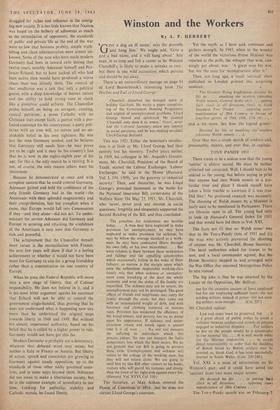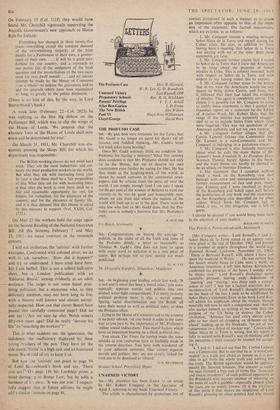Winston and the Workers
By A. P. HERBERT 4 IVE a dog an ill name,' says the proverb, `and hang him.' We might add, 'Give a god a bad name, and it will hang about.' Any man, in so long and full a career as Sir Winston Churchill's, is likely to make a mistake or two: but there is one wild accusation .which persists and should be put away.
There is an extraordinary passage on page 94 of Lord Beaverbrook's interesting book The Decline and Fall of Lloyd George: Churchill disturbed the tranquil spirit of holiday Gairloch. He wrote a paper complain- ing of the Government Housing Programme and neglect of unemployment problems. Lloyd George fumed and spluttered. He claimed 'Churchill only does it to annoy.' Never, never had the Colonial Secretary taken any interest in social questions, and he was making mischief, Lloyd George declared.
This was 1921. Either the historian's recollec- tion is at fault or Mr. Lloyd George had then entirely lost his memory. Twelve years earlier, in 1909, his colleague in Mr. Asquith's Govern- ment, Mr. Churchill, President of the Board of Trade, started the Labour Exchanges. 'Labour Exchanges,' he said in the House (Hansard, Vol. 1, 194, 1909), 'are the gateway to industrial security.' Then, and thereafter, he was Lloyd George's principal lieutenant in the battle for the National Insurance Bill, cornerstone of the Welfare State. On May 25, 19,11, Mr, Churchill,
who 'never, never took any interest in social questions,' lengthily and eloquently supported the Second Reading of the Bill, and thus concluded :
The penalties for . misfortune are terrible today. . .. A man may have neglected to make provision for unemployment; he may have neglected to make provision for sickness; he may be below the average standard as a work- man; he may have contracted illness through his own folly or his own misconduct. . . . But 'what relation is there between these weaknesses and failings and the appalling catastrophes whieh occasionally follow in the wake of these failures; so narrow is the margin upon which even the industrious respectable working-class family rely that when sickness or unemploy- ment come knocking at the door the whole economy and even the status of the family are imperilled. The sickness may not be severe; the unemployment may not be prolonged. The good offices of friends and neighbours may carry the family through the crisis; but they come out with an accumulated weight of debt, and .with furniture and clothing scattered at ruinous rates. Privation has weakened the efficiency of the bread-winner, and poverty has set its stamp upon his appearance. If sickness and unem- ployment return and knock again a second time it is all over. . . . No one can measure the suffering to individuals which this process causes. No one can measure the futile unnecessary loss which the State incurs. We do not. pretend that our Bill is going to prevent these evils. Unemployment and sickness will return to the cottage of the working man, but they will not return alone. We are going to send him by this Bill other visitors to his home, visitors who will guard his fortunes and strerig- then the force of his right arm againstevery 'foe. (Hansard, Vol. XXV], Col. 510.) The historian, as Max Aitken, entered the House, of .CoM mons in 1910: .but he does not correct Lloyd George's assertion. Yet the myth, as I have said, continues and gathers strength. In 1945, when to the wonder of the world the victorious Prime Minister was rejected at the polls, the whisper that won, cun- ningly put about, was: 'A great man for war, but not the man for reconstruction after it.'
Then, not long ago, a small 'satirical' sheet published in London printed this surprising sentence: •
The Greatest Dying Englishman devoted his life to . smashing the workers (shooting Welsh miners, General Strike etc.) . . . putting back clock in all directions (back to Gold
Standard. Free Trade) . . opposing every manifestation of 20th Century in favour of long-lost glories of 19th,' 18th, 17th etc. . . .
and a lot more. See how the legend grows:.
Devoted his life to smashing the' workers (shooting Welsh miners . . .).
Over that was a crude sketch of soldiers and, presumably, miners; and over that, in capitals:
TONY PANDY 1911
There szerns to be a notion now that the young `satirist' is almost sacred. He must be neither criticised nor corrected. Well, I should hate to be unkind to the young; but before saying in print that anyone had shot Welsh miners at a par- ticular time and place I should myself have taken a little trouble to ascertain if it was true. Did they? No profound research was necessary. The shOoting of Welsh miners by a Minister is fairly sure to be mentioned in Parliament. There are libraries open to all. The young had only to look up Hansard's General Index for 1911 and that would have led them to Vol. XXI.
The facts are. (i) that no Welsh miner' was shot in the Ton-y-Pandy riots of 1911 and (ii) the man who actively prevented the shooting of anyone was Mr. Churchill, Home Secretary. The local authorities asked for troops to be sent, and a local commander agreed. But the Home Secretary stepped in, and arranged with the War Office that unarmed Metropolitan. Police be sent instead.
The big joke is that he was attacked by the Leader of the Opposition, Mr. Balfour,
not for the excessive amount of force employed but for not employing sufficient force fornot sending military instead of police—for not send- ing military soon enough. . . . (Col. 227.)
Mr. Churchill replied :
Law and order'must be preserved, but . .. it is a great object of public policy to avoid a collision between soldiers and crowds of persons engaged in industrial disputes.. . . For soldiers to fire on the people would be a catastrophe in our national life. . . It is well worth while for the Minister responsible . . . to accept
direct responsibility in order that the shedding of British blood by British soldiers may be averted, as, thank God, it has been successfully averted in South Wales. (Cols. 239-240.) Vol. XXI is a mine of information on Sir Winston's past; and it could have saved the `satirists' from two more major errors:
He devoted his life . . to putting back
clock in all directions . opposing every manifestation of 20th Century . . .
The Ton-y-Pandy speech was on February 7. On February 15 (Col. 1118) they would have found Mr. Churchill vigorously supporting the Asquith Government's new approach to Home Rule for Ireland: Everything has changed in these twenty-five years—everything except the constant demand of the overwhelming majority of the Irish people for a Parliament of their own, a govern- ment of their own. . . . It will be a great mis- fortune for our country, and a reproach to our public life, if the settlement of the Irish question and the reconciliation of the two races must for ever dwell outside . , . and no sincere attempt be made by the House of Commons —as a whole—to redress the grievances and to end the quarrels which have been maintained so long, so greatly to the public detriment.
(There is no hint of this, by the way, in Lord Beaverbrook's book.) A week later (February 22—Col. 2023) he was replying to the first big debate on the Parliament Bill, which was to clip the wings of the House of Lords. 'We propose that the absolute Veto of the House of Lords shall -now cease and be determined for ever.'
On March 31, 1911, Mr. Churchill was elo- quently pressing the Shops Bill, for which his department was responsible :
The British working classes do not mind hard work. They are the most industrious and cer- tainly the most productive workers in the world. But what they ask with increasing force year by year is that there shall he .a fair proposition of life. What they ask for with increasing force is that after the work is over there shall be a fair and reasonable opportunity for rest, for leisure, for recreation, for the pleasures of the country, and for the pleasures of family life, and it is that demand that this House is asked by this measure to support. (Vol. XXIII,' Col. 1753.)
On May 25 the workers hold the stage again on the Second Reading of the National Insurance Bill. All this between February 7 and May 25, 1911—no mean overture to the twentieth century.
I will not embarrass the 'satirists' with further examples. Confronted with colossal error, we do well to ask ourselves: 'How did it happen?' and try to understand. I have tried hard here, but. I am baffled. This is not a school half-term sheet, but a London publication with an 'Editorial Board,' aiming evidently at an adult —audience. The target is not some hated prac- tising politician, but a statesman who, as they delicately mention, may not have long to live, with a history well known and almost univer- sally respected. How can that clever. Board have passed this carefully concocted page? Did no one say : 'Are we sure he shot Welsh miners fifty-two years ago? Did he really "devote his life" to "smashing the workers"?'
This is what saddens me, the ignorance, the indolence, the inefficiency displayed by these young b:others of the pen. They have let the side down.-`Satire' is a high task and an honoured name. We should all try to keep it so.
But now the `satirists' can point to .page 94 of Lord Bea verbrook's book and say, 'There you are!' 0 1 page 116 his Lordship prints a letter darnag g to Bonar Law; but he adds a footnote of ; own : It was not true.' I respect- fully suggest that in future editions he might add a similar ::,,otnote on page 94.































 Previous page
Previous page